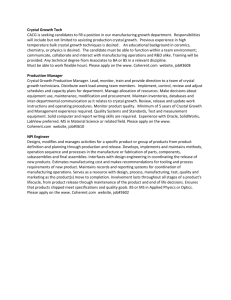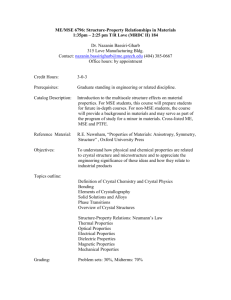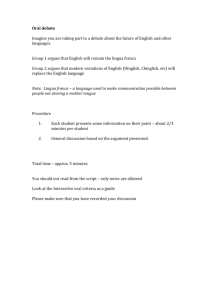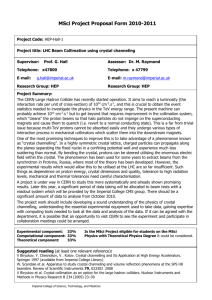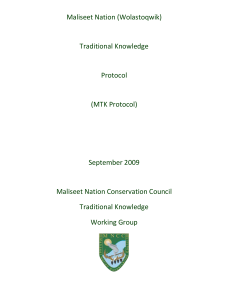When a language rises
advertisement
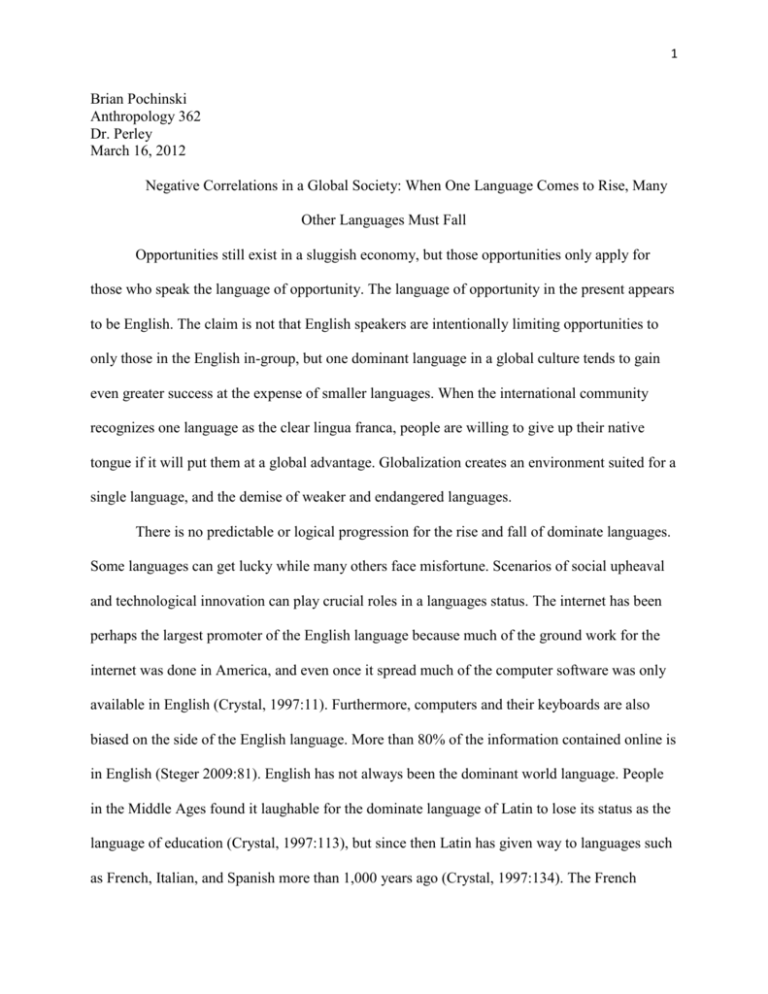
1 Brian Pochinski Anthropology 362 Dr. Perley March 16, 2012 Negative Correlations in a Global Society: When One Language Comes to Rise, Many Other Languages Must Fall Opportunities still exist in a sluggish economy, but those opportunities only apply for those who speak the language of opportunity. The language of opportunity in the present appears to be English. The claim is not that English speakers are intentionally limiting opportunities to only those in the English in-group, but one dominant language in a global culture tends to gain even greater success at the expense of smaller languages. When the international community recognizes one language as the clear lingua franca, people are willing to give up their native tongue if it will put them at a global advantage. Globalization creates an environment suited for a single language, and the demise of weaker and endangered languages. There is no predictable or logical progression for the rise and fall of dominate languages. Some languages can get lucky while many others face misfortune. Scenarios of social upheaval and technological innovation can play crucial roles in a languages status. The internet has been perhaps the largest promoter of the English language because much of the ground work for the internet was done in America, and even once it spread much of the computer software was only available in English (Crystal, 1997:11). Furthermore, computers and their keyboards are also biased on the side of the English language. More than 80% of the information contained online is in English (Steger 2009:81). English has not always been the dominant world language. People in the Middle Ages found it laughable for the dominate language of Latin to lose its status as the language of education (Crystal, 1997:113), but since then Latin has given way to languages such as French, Italian, and Spanish more than 1,000 years ago (Crystal, 1997:134). The French 2 Revolution further propelled the status of the French language and inadvertently slowed the use of smaller languages that lacked the prestige that French had (Dorian, 1998:7). History shows that there have been numerous languages that have risen and fallen in dominance and prestige. One key revolution could be one languages rise to prominence, but another languages slope toward extinction. Social policy can play a major role in what languages are being spoken by people in the world. The Emerson Bill of 1995 states “the United States should maintain a language common to all people” and “the purpose of this Act is to help immigrants better assimilate and take full advantage of economic and occupational opportunities in the United States” (Crystal, 1997:120). The United States already consists of a 95% or more English speaking population (Crystal, 1997:76). With the dominant use of English in the US, it is no surprise that 80% of North American languages are no longer being learned by children (Perley, 2012b:13). Some people argue that multilingual policies are too expensive to implement in the United States, but the opposition has rebutted by claiming that it is too expensive not to adopt multilingual policies (Crystal, 1997:123). The sluggish economy of today is certainly not helping multilingual policy due to the initial costs. Furthermore, if even individuals that are speaking a dominant language are facing socio-economic burdens, then those who have not adopted a dominant tongue are at an even greater disadvantage due to the lack of resources available to them. Giving up an indigenous language for a more dominant language or at least becoming proficient in a dominant language can provide many advantages. English has become so dominant that even countries that have not adopted English as their official language are teaching higher education in English (Crystal, 1997:102-103). In 2014 the Italian University Politecnico di Milano will become an English speaking school because the school wants to be more 3 international “and the only way to have international classes is to use the English language" (Coughlan, Sean: bbc.com). English reigns on top of the academic world outside of the class room as well. In 1981 the percent of articles appearing in scientific journals consisted of 85% of the biology articles, 73% of the medical articles, 69% of the math articles, and 67% of the chemistry articles (Crystal, 1997:102). Even the journal Linguistic Abstracts published almost 90% of its articles in English in 1995 (Crystal, 1997:102). Educational institutions and academic journals are among the most important resources for information and all of them are dominated by the English language. Access to information can provide many advantages in life, but those advantages only apply to individuals who are literate in the language that is used to convey that information. It does not seem to be much of a surprise that people are willing to abandon their native tongue in order to take advantage of the opportunities that dominate languages such as English can offer. Bernard Perley is a great example of the advantages that can be offered to individuals choosing to adopt a dominant language. In the first grade Perley only spoke Maliseet in a mainly white and English speaking school, and because of the alienation that was experienced from being outside of the dominate mode of communication, Perley’s mother decided that if Perley was to “survive out there he’ll have to master English” (Perley, 2012a:133). The language suicide appears to have paid off because Perley is now a published Linguistic Anthropologist as well as a professor at the University of Wisconsin-Milwaukee. Perley even received his PH.D. from the very prestigious English speaking educational institution of Harvard (Anthropology Department: uwm.edu). Despite the fact that educational institutions have been noted as one of the assimilatory processes undermining endangered languages (Perley, 2012a:132), Perley has been able to use his English education to create a novel that re-integrates Maliseet oral traditions 4 back into the Maliseet language, religion, and landscape (Perley, 2012a:134). Anthropologists can use the global culture to fight for endangered languages across the world. It is unfortunate that this glimmer of hope appears to be overshadowed by larger and more powerful global organization that appear to benefit from a single global language. Globalization brings together nations and cultures from around the world to meet and discuss issues. Organizations such as the United Nations, the World Bank, UNESCO, UNICEF, and the World Health Organization all benefit from having a common language (Crystal, 1997:10). Could you imagine how difficult a United Nations conference would be if forty or fifty languages were used? Each language would need an interpreter for every other language being spoken at the conference. The use numerous translators for global organizations is a very expensive and time consuming. A lingua franca is a major convenience in a global world. Because 25% of the world is already competent in English (Crystal, 1997:4), the English language is an obvious choice for a lingua franca to be used by world organizations. There are more than 100 countries that have adopted English as their primary foreign language taught in school (Crystal, 1997:3). If the world has a lingua franca, it would certainly appear to be English. Dominant languages are supported by dominant cultures. English is the dominant language today, and America has been the dominant culture for much of the 20th century. The defeat of Germany in WWII helped put English on a path to dominance in the early 20th century (Crystal, 1997:74). The United States population doubled between 1900 and 1950 (Crystal, 1997:29). The dramatic increase in population of the growing US economy after WWII helped push the English language towards dominance (Crystal, 1997:63), but no single development could have propelled English to its current status (Crystal, 1997:69). Educational institutions, 5 mass media, and the internet have all played obvious roles in language choice. Neutrality can also affect language choice. Ghana and Nigeria have seen English as a neutral language, so they have given it official status in their culture (Crystal, 1997:76). English also has the advantage of being the language of global communication. If the American culture were to decline, so too could the English language. History as already shown us that dominant cultures rise into power, but they will eventually fall; with the fall of a culture comes the fall of the language of that culture. The use of a dominant global language does not benefit endangered languages across the world. Some experts predict that half of the languages today will not survive another century, while others say as much as 70% of the world’s languages will disappear in the next century (Perley, 2012a:127). Canada is expected to be left with only three languages within the next twenty years (Perley, 2012a:128). Just because a language dominated by a more powerful language does not mean it has to die. The Welsh language has recently grown in power despite being subjected to hundreds of years of English domination (Crystal, 1997:119). The Miami language has even made a revival through the help of David Baldwin after being declared extinct (Perley, 2012b:21). Despite some glimpses of hope for some endangered languages, the fact still persists that many endangered languages are on the likely road toward extinction. Most languages do not return from extinction. Language extinction generally leads to documented remnants of what once was but is no more. The overall picture of globalization is not good for endangered languages. Any advantages offered by global culture seem to be counteracted by what is an advantage for global organizations. It is very difficult and costly to conduct international relations with an array of different languages which creates the desire for a lingua franca. The current lingua franca seems 6 to be English through the support of education, technology, and social policy. English does not have to remain on top, as the history of dominant languages and cultures has shown. Whichever culture gains the most advantages from our global society will like speak the language which will rise to prominence, but unfortunately this will likely happen at the expense of endangered languages that are not able to reap the advantages in a global culture. 7 Works Cited Anthropology Department. UW-Milwaukee. uwm.edu. Web. May 10, 2012. Coughlan, Sean. “Italian University Switches to English.” BBC News. uwm.edu. May 16, 2012. Web. May 16, 2012. Crystal, David. English as a Global Language. Cambridge: Cambridge University Press, 1997. Print. Dorian, Nancy. Eds. Grenoble, Lenore and Whaley, Lindsay. “Western Language Ideologies and Small Language Prospects.” Endangered Languages: Language Loss and Community Response. Cambridge: Cambridge University Press, 1998. P 3-21. Print. Perley, Bernard. “Last Words, Final Thoughts: Collateral Extinctions in Maliseet Language Death.” The Anthropology of Extinction: Essays on Culture and Species Death. Ed. Sodikoff, Genese. Bloomington: Indiana University Press, 2012a. P 127-142. Print. Perley, Bernard. “Zombie Linguistics: Experts, Endangered Languages and the Curse of Undead Voices.” 2012b. Print. Steger, Manfred. Globalization: A Very Short Introduction. Oxford: Oxford University Press, 2009. Print.


